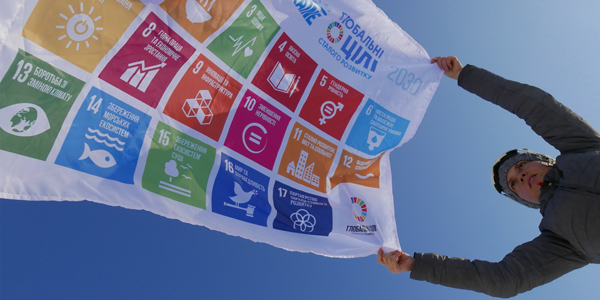A week ahead of the UN SDG Summit in New York, an event organised by the Institute of Development Studies (IDS) used the mid-point of the Sustainable Development Goals to take stock of global collaboration on development.
Entitled Hope at the halfway point: Forging a shared agenda for change, the discussion brought together a range of speakers from around the world to reflect on ways in which the post-2030 global agenda can build on lessons from the SDGs era, focusing on geopolitical shifts, questions around accountability and how to incorporate the views and needs of the most marginalised. The event was chaired by IDS Director of Research, Peter Taylor.

Carlos Alvarado Quesada, Professor of Practice of Diplomacy, The Fletcher School, Tufts University and former President of Costa Rica spoke about the need to recognise the beauty in the ambition behind the SDGs.
“The SDGs are important as they provide a comprehensive roadmap for our common path as humanity and ambitious as it sounds, the 17 objectives actually have the wisdom to profoundly impact every dimension of human development in a way that embraces the diversity of humankind across the globe,” he said.
And yet, as Mary James Gill, Executive Director for Law & Justice in Pakistan pointed out, the SDGs have not been successful in tackling inequalities, and the “leave no-one behind” principle has not been widely put into practice. “Historically marginalised groups reveal stark educational disparities in Pakistan,” she said. “Only 27% of children from the poorest households finish primary education compared to 77% of the most privileged ones.”
Jemimah Njuki, Chief of Economic Empower, UN Women, acknowledged that there have been some gains in gender equality, pointing to sharp drops in maternal mortality as one example. Yet in many cases we know what to do, but action is not going in the right direction. “We know that legal frameworks can protect women and girls,” she said, “yet many countries are stepping away from that.”
Back to founding principles
So what can be done to improve progress towards the SDGs?
Jing Gu, Director of the IDS China Centre talked about the importance of what she termed “Sustainable Development Diplomacy”, recognising that rapid progress on the SDGs is contingent improvements to the US-China relationship. “The US-China relationship is the defining geopolitical relationship of the 21st century,” she observed, listing climate change as a key area where improved engagement between the two superpowers is essential.
Echoing the need for greater global collaboration, John Thompson, Research Fellow at IDS and Deputy Director of the Sussex Sustainability Research Partnership argued that focus should be redirected away from goals and targets and towards the founding principles of the SDGs, such as indivisibility, integration and universality. This would enable commonalities between different goals to be unlocked and inspire action that can simultaneously address multiple goals. “This can help to safeguard against social and economic progress being pursued at the expense of environmental integrity,” he suggested.
The need to address national debt in the global South was brought up by several speakers. “The high levels of debt faced by many countries is one of the biggest challenges to implementing the SDGs,” said Carlos Alvarado, highlighting the importance of the Bridgetown Agenda in addressing this challenge. Jing Gu stressed the importance of China in this issue, noting that during the last 10-15 years China has rapidly increased its overseas development finance, and as a result has become a major holder of national debt.
Acceleration, or inclusion?
A concern raised by Andrea Ordóñez Llanos, Executive Director at Southern Voice, was a paradox contained in the SDGs that can lead policymakers to act in ways that are not always helpful.
“A lot of the negative consequences of inclusion because of the [Covid-19] pandemic were due to a very fast response by governments in aspects where they were not prepared to respond.” She used the example of education, where the shift to digital teaching happened very quickly, but in unequal settings it created more gaps because of the limitations of digital access. “This highlights the paradox between acceleration, and inclusion.”
So, where next for the SDGs, and the post 2030 agenda? Concluding the event, Melissa Leach, Director of IDS, suggested that post-2030 action needs to operate a two levels. “At one level, we really need to recapture that ambition at that imagination, that singular universal commitment,” she said. “But then underneath that commonality I think we need to be realistic about creating space for a plurality of pathways, which will involve negotiation and tensions, economic, social, and geopolitical.”
